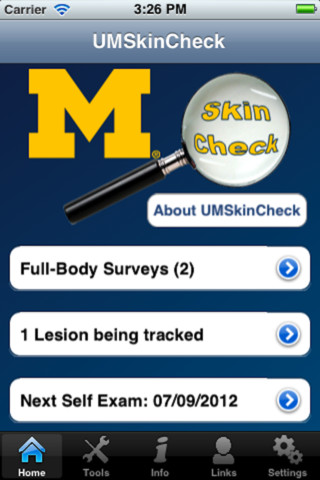 Physicians at the University of Michigan Health System launched an app for patients at-risk for skin cancer to use at home to self-exam their moles and other skin lesions over time. The free app, called UMSkinCheck, is just the latest in skin cancer tracking and near-diagnostic apps to hit Apple's AppStore in the past year. UMSkinCheck is available for iPhone and iPad users.
Physicians at the University of Michigan Health System launched an app for patients at-risk for skin cancer to use at home to self-exam their moles and other skin lesions over time. The free app, called UMSkinCheck, is just the latest in skin cancer tracking and near-diagnostic apps to hit Apple's AppStore in the past year. UMSkinCheck is available for iPhone and iPad users.
Unlike many other skin cancer detector and analysis apps, UMSkinCheck, mostly sends reminders to users and enables them to monitor changes in their skin lesions by instructing them to take photos of various regions of their body for storage in the app and comparison to future images the users take. The physicians who developed the app believe it could be a helpful tool for patients to bring into the exam room during consultations with their own care providers.
"Whole body photography is a well-established resource for following patients at risk for melanoma. However, it requires a professional photographer, is not always covered by insurance, and can be an inconvenience. Now that many people have digital cameras on their phones, it's more feasible to do this at home," Dr. Michael Sabel, associate professor of surgery at the U-M Medical School, the lead physician involved in developing the app, said in a written statement.
According to the University of Michigan Health System, more than 2 million people are diagnosed with skin cancer each year in the US, and of those about 50,000 will be diagnosed with melanoma. The UMSkinCheck developers state that regular skin checks can help people discover cancer sooner. The app also includes a skin cancer risk calculator.
A similar app, called Skin Scan, which has been available for download since last summer, instructs users to take photos of their moles and upload them to Skin Scan's servers for analysis. The app then provides a risk rating for the mole and highlights any abnormalities that it can detect in the lesion -- despite some reports, it does not claim to diagnose skin cancer.
In February, Skin Scan's Mircea Popa told GigaOM that the company's longterm plans include connecting physicians to its platform so that doctors could examine patients remotely, or without in-person visits. According to Skin Scan, its app can accurately predict the severity of a mole 70 percent of the time, while dermatologists can do so with 85 percent accuracy.
Of course, not everyone is enthusiastic about skin cancer detector apps.
"The [apps] that worry me are ones for instance where you can take an image of a skin lesion and then map it back to a database in the cloud and be told whether it should be evaluated for a melanoma or not," Dr. Joseph Kvedar, a dermatologist by training, and the head of Partners Center for Connected Health in Boston, told NPR in an interview this week. "It just seems a little scary right how to have software making decisions about moles."














